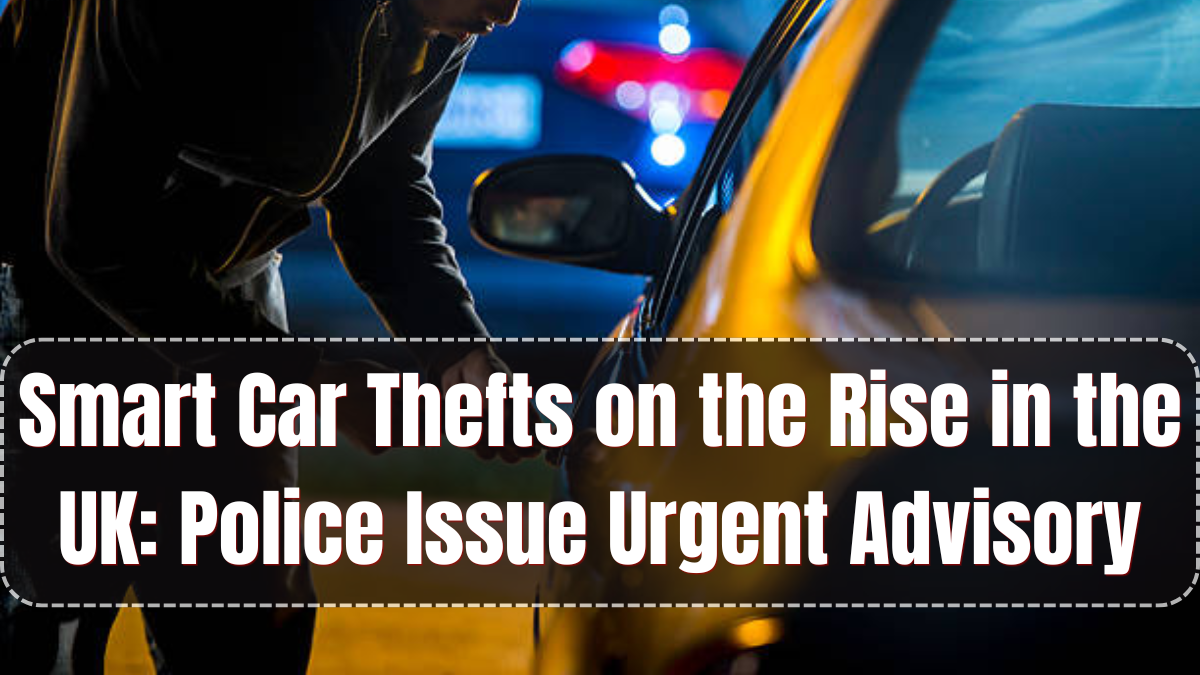Smart cars offer convenience, connectivity, and innovation, but in 2025, they’ve also become prime targets for tech-savvy criminals. UK police have reported a sharp increase in smart car thefts and have issued an urgent advisory to inform and protect citizens. As these vehicles become more embedded with wireless technology and keyless systems, their security vulnerabilities are also drawing the attention of thieves nationwide.
The surge in smart car thefts is not isolated to one region. Metropolitan areas such as London, Birmingham, and Manchester have reported significant year-on-year increases. These crimes often occur silently, without broken glass or forced entry—making them difficult to detect and harder to trace.

Why Smart Cars Are Being Targeted
Smart cars typically come equipped with keyless entry, push-start functionality, GPS systems, and remote app controls. While these features provide users with modern conveniences, they also create opportunities for cybercriminals to exploit.
Thieves now use advanced tools such as relay boxes and signal boosters to mimic a car key’s proximity signal. Even if the key is inside your house, criminals can clone the signal and unlock your car in seconds. In many cases, these vehicles are stolen directly from driveways, with no physical damage—making insurance claims harder and slower to process.
Key Statistics from 2025 Reports
According to the latest data released by the UK’s National Vehicle Crime Intelligence Service (NaVCIS):
-
Smart car thefts have risen by 31% in 2025 compared to last year.
-
Over 18,000 vehicles were stolen in the first half of the year.
-
72% of those vehicles used keyless systems.
-
Most thefts occurred in residential neighbourhoods between 1 AM and 5 AM.
High-end models with sophisticated onboard technology, especially from brands like BMW, Mercedes-Benz, Land Rover, Ford, and Tesla, were most frequently targeted.
Most Affected Vehicles and Brands
Some car models appear more frequently in theft reports due to their popularity and technology systems:
-
BMW X5 and 3 Series
-
Range Rover Evoque and Discovery Sport
-
Tesla Model 3 and Model Y
-
Ford Kuga and Fiesta
-
Mercedes-Benz C-Class and A-Class
These models often use wireless keys, remote control access, and mobile app connectivity—features that thieves can exploit using inexpensive hacking tools available online.
Police Guidelines to Protect Smart Vehicles
In response to the surge, police have issued a list of urgent precautions to protect smart car owners from theft:
-
Store your car key and spare keys in a Faraday pouch that blocks wireless signals.
-
Disable the keyless entry function if your vehicle allows.
-
Install a steering wheel lock or gear shift lock as a visible deterrent.
-
Use a GPS tracker to monitor your vehicle in real time.
-
Update your car’s software regularly to fix known security flaws.
-
Park in well-lit or CCTV-monitored areas, especially at night.
By taking these steps, car owners can significantly reduce their risk and deter criminals who are usually looking for the easiest, fastest target.
How the Insurance Industry Is Responding
Insurance companies in the UK are adapting to this growing threat. Some have started to revise policy conditions for high-risk vehicles. Owners of frequently targeted models may face higher premiums unless:
-
Additional security features are installed.
-
The vehicle is parked in a secure garage.
-
A telematics tracker is used.
Several insurers now offer discounts for vehicles that have been fitted with Thatcham-approved alarms, immobilisers, or real-time vehicle monitoring systems. Others may even reject claims if there’s no sign of forced entry and no security precautions were taken.
Government and Manufacturer Response
The UK government has launched an initiative to address the rise in tech-enabled vehicle thefts. The Department for Transport is working with car manufacturers to enforce stricter cybersecurity standards for all new vehicles.
Key actions being discussed include:
-
Mandating encrypted wireless keys.
-
Requiring multi-factor authentication for app-based vehicle access.
-
Updating vehicle cybersecurity guidelines under UNECE WP.29 regulations.
Vehicle manufacturers have also begun releasing software patches to address vulnerabilities in their systems. Tesla, for example, rolled out a new “PIN to Drive” feature, requiring a four-digit code before the car can be started—even if it’s unlocked.
FAQs
What is a relay theft and how does it work?
Relay theft is when thieves use a signal amplifier to mimic your car key’s wireless signal and unlock/start your vehicle without physical access to the key.
Are certain car brands more vulnerable to smart theft?
Yes, brands with keyless entry and push-start systems like BMW, Tesla, and Land Rover are often targeted. However, all smart cars are vulnerable without proper security measures.
Will my insurance cover a keyless car theft?
It depends on your policy and whether you took reasonable precautions. Some insurers may deny claims if no visible signs of forced entry are present and basic security tools were not used.
How can I block my car key’s signal?
Use a Faraday pouch or box, which is lined with material that prevents radio frequency signals from escaping.
Can I turn off the keyless entry system in my car?
Many vehicles allow this through their onboard settings. Check your vehicle’s user manual or contact your dealer for help.
